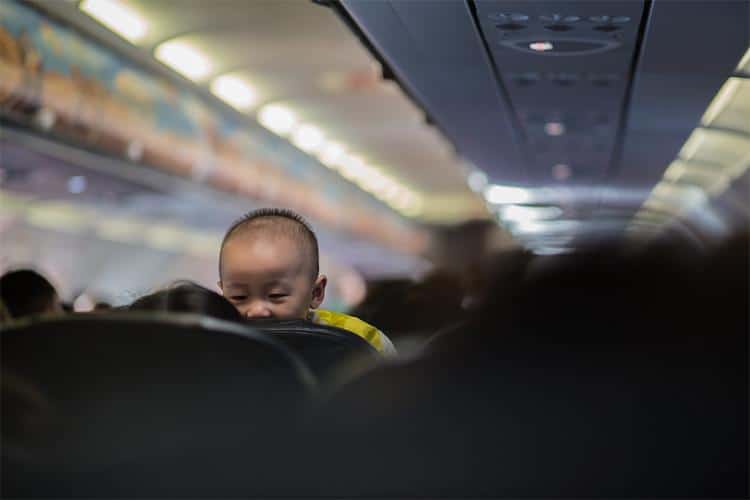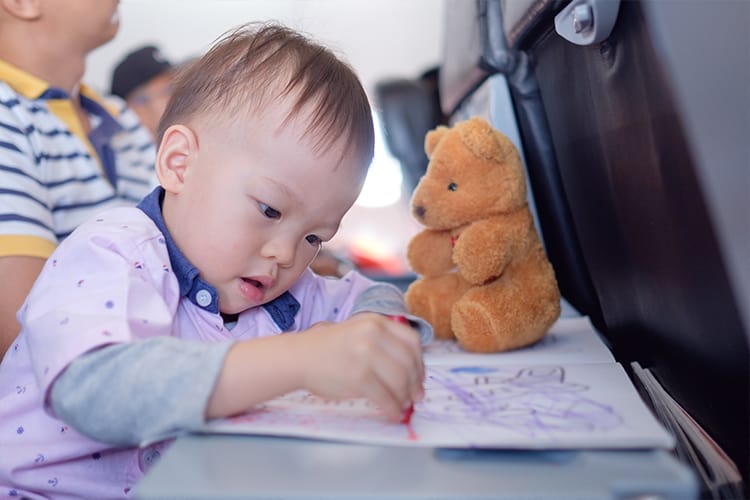Jet lag can be a challenging experience for anyone, but it can be especially difficult for young children’s parents to handle. Infants and toddlers don’t have the same ability to understand and jump into the new time as adults, making it tough for parents to navigate the adjustment. However, with careful planning and gentle guidance, you can help your little ones survive jet lag and settle into their new time zone as quickly as possible.
This article will explore practical strategies for beating toddler jet lag, from adjusting sleep schedules to creating a comfortable environment for rest and relaxation. By approaching the issue with empathy and understanding, parents can help their children transition smoothly and minimize the impact of jet lag on the whole family’s well-being. So, if you have an upcoming trip with your little ones, keep reading to learn how to adjust as seamlessly as possible.
New Time Zone: What is Toddler and Baby Jet Lag?

Photo: Octav Cado
Toddler and baby jet lag occurs when young children experience disruptions to their sleep and waking patterns after traveling across time zones. Just like adults, toddlers and babies can struggle with the effects of jet lag, including difficulty falling asleep, waking up early, or feeling excessively tired during the day. The main difference is that young children may have difficulty adjusting to the time zone, leading to increased crankiness and irritability.
Parents may also find it challenging to deal with their child’s jet lag symptoms, as babies and toddlers are still developing their ability to regulate their sleep schedules, unlike older kids who may get over jet lag fast.
What are Jet Lag Symptoms in Children?

Photo: Kelly Sikkema
Jet lag in children can manifest in various ways, including sleep disturbances, irritability, difficulty concentrating, and changes in appetite. When children experience jet lag, they may have trouble falling asleep at bedtime or wake up frequently during the night. Additionally, they may feel sleepy or tired during the day, impacting their mood and behavior. Some children may also have difficulty focusing at school or exhibit signs of hyperactivity due to the disruption of their natural sleep patterns.
Changes in appetite, such as cravings for certain foods or a lack of interest in eating, are also common symptoms of jet lag in children. Parents need to recognize these symptoms and help their children adjust to the new time zone by establishing a consistent sleep schedule, encouraging outdoor activity during daylight hours, and promoting healthy eating habits. By addressing these symptoms, parents can help their children overcome jet lag and get them back on track more effectively.
How Long Does Toddler Jet Lag Last?

Photo: Jelleke Vanooteghem
The duration of toddler jet lag can vary depending on the distance traveled and the individual child. Generally, a toddler can take a few days to a week to fully adjust to a new time zone when traveling. Young children’s internal clocks are still developing, so they may have a harder time adapting to the time difference than adults.
To help ease the effects of jet lag, parents can gradually adjust their child’s sleep and meal schedules leading up to the trip, expose the child to natural light during waking hours in the new zone, and maintain a consistent bedtime routine. Offering comfort and understanding during this transition period is also important for disoriented or restless toddlers.
Adjusting Nap Time: Top Tips to Prevent Jet Lag in Kids

Photo: Katie Emslie
A bad case of jet lag isn’t fun! To help avoid jet lag in babies and toddlers, there are some strategies parents can use, including:
- Adjusting their sleep schedule to the new time zone a few days before the trip, gradually shifting their bedtime and nap times by 15-30 minutes daily.
- Ensure your little one is well-rested before the trip, and keep them hydrated during the long flight.
- Once you’ve arrived at your destination, try to keep your child active and exposed to natural light during the day to help regulate their internal clock.
- Maintain a familiar bedtime routine, such as reading a story or singing a lullaby, to signal your little one that it’s time to sleep.
These jet lag tips are a good way to get babies to sleep better after a time zone change. Overall, aiming to be patient and understanding when your baby or toddler has to deal with jet lag can also help ease the transition for young children.
FAQs on Jet Lag in Infants and Toddlers
How long does it typically take for toddlers to adjust to a new time zone?
It typically takes toddlers a few days to a week to adjust to a new time zone. Traveling to a different time zone can disrupt a child’s internal body clock, resulting in difficulties with sleep and meal times. However, toddlers can gradually adapt to the new schedule with patience and a consistent routine. Maintaining a familiar bedtime and wake-up routine is important, even if it means adjusting nap times and meal times to align with the new time zone. Gradually shifting their schedule by small increments helps ease the transition.
Exposing them to natural light and outdoor activities during the day can help regulate their internal clock. While it may be challenging at first, understanding and accommodating your toddler’s needs during this adjustment period is key. With time and patience, most toddlers will eventually adapt to the new time zone and return to their usual sleep and meal patterns.
Are there safe supplements or medications to help my child recover from jet lag?
While some options are available, it’s important to consult with a pediatrician before giving your child any supplements or medications. Melatonin, for example, is a natural hormone that can help regulate sleep patterns and is sometimes used to manage jet lag in children and help them sleep through the night. However, it’s vital to use it under the guidance of a healthcare professional, as the appropriate dosage varies depending on the child’s age and weight.
Other non-medicinal strategies can help manage jet lag in children, such as gradually adjusting the child’s sleep schedule before traveling and encouraging exposure to natural light at appropriate times. Ultimately, the safety and effectiveness of any supplement or medication will depend on your child’s individual health and needs, so seeking guidance from a healthcare provider is the best course of action.
How does jet lag differ between eastward and westward travel?
Jet lag is a temporary sleep disorder that occurs when our internal biological clock is out of sync with the time at our travel destination. When traveling eastward, jet lag may be more severe as our body needs to adjust to a shorter day and an earlier time zone. This can lead to difficulties falling asleep at night and feeling lethargic during the day. On the other hand, when traveling westward, our body has a somewhat easier time adjusting to the local time as it tries to extend the day and adapt to a later time zone.
While jet lag can affect individuals differently, it is important to be mindful of the potential effects and take steps to mitigate them. This may include adjusting your sleep schedule in the days leading up to your trip, staying hydrated, and getting exposure to natural light at the appropriate times.
Is there an ideal time to fly to minimize jet lag impact?
When it comes to minimizing jet lag impact, frequent flyers swear by the claim that flying at certain times can help reduce its effects. While there may not be a one-size-fits-all answer, some travelers find that flying overnight and arriving at their destination in the morning helps them adjust to the new time zone more easily. This allows them to sleep on the plane and then stay up during the day once they arrive.
Others suggest gradually flying daily to adjust their sleep schedule before landing. Ultimately, the ideal time to fly to minimize jet lag impact may vary from person to person, depending on their individual preferences and how their body reacts to travel. It is important to listen to your body and experiment with different flight times to find what works best for you. Regardless of the time, it is important to stay hydrated, move around the cabin, and get some rest to help mitigate the effects of jet lag.
Can recurrent travel and frequent jet lag have long-term effects on my child?
Traveling frequently and experiencing jet lag repeatedly can indeed have long-term effects on your child. Jet lag can disrupt their regular sleep patterns, leading to potential long-term sleep issues. It can also impact their physical and mental well-being, causing fatigue, irritability, and difficulty concentrating. Additionally, the constant changes in time zones can disrupt their circadian rhythm, which may affect their overall health.
It is important to consider the potential long-term effects of recurrent travel and jet lag on your child’s development and well-being. As a parent, it’s crucial to prioritize their health and establish routines that can help minimize the impact of jet lag. Ensuring they have time to rest and adjust to the new time zone, staying hydrated, and maintaining a healthy diet can mitigate the long-term effects of frequent travel and jet lag on your child.
Conclusion
Depending on how many time zones you cross compared to your home time zone, baby and toddler jet lag can be brutal. Not only are you likely trying to adjust to a time change, but you are also trying to help your baby adjust, especially babies under 6 months. These tips to help your kids beat jet lag will reduce night wakings as soon as possible, and your babies will sleep at the right time again. Stay patient; jet lag can take a few days to leave toddlers and kids. With a bit of preparation before traveling with kids, you can reduce the chances of dealing with jet lag in toddlers and babies.

Morgan French is a wife, mom of two, writer & editor. After traveling for 3 years with her family, she now lives back in her hometown of Dayton, OH. She makes frequent stops for coffee, enjoys the outdoors, and loves board games.



Leave A Comment